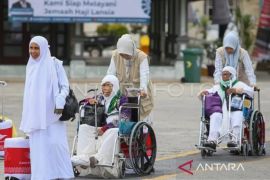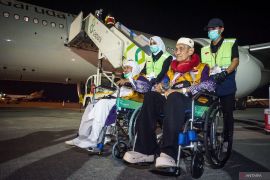"Pilgrims who do outdoor activities under extreme hot weather conditions must be careful with heat strokes," he said here on Sunday.
Dr. Untung who practices at the Prof. Dr. Margono Soekarjo public hospital in Purwokerto, Banyumas District, Central Java, explained that heat stroke is the most serious condition of "heat injury" and can cause death.
"This heat stroke can occur because there is a failure process to control heat and failure of the heart and blood vessels of our body, a person can be affected by this heat stroke, even in healthy conditions," he said.
He said signs of heat stroke are body temperature reaching above 40.5 degrees Celsius, decreased blood pressure, breathing disorders and heart palpitations.
In addition, he said, heat stroke also causes changes in condition or mental status, and a person's reduced ability to lower body temperature.
"Signs of life-threatening heat stroke are the occurrence of a blockage in blood vessels, nosebleeds, bleeding from veins, bruising, pulmonary swelling and also signs of acute kidney failure," he said.
He added that the symptoms commonly found in heat stroke patients are experiencing fatigue, dizziness, nausea and vomiting.
Meanwhile, he also reminded prospective pilgrims to increase water consumption to avoid dehydration.
"Dehydration is easily recognized by monitoring the color of urine, drastic weight loss, thirst, feeling uncomfortable, flushing, excessive anxiety, cramps, apathy, laziness, headache, nausea, vomiting, feeling cold, stiff neck and also feel cold," he said.
Translator: Wuryanti Puspitasari/Bambang P
Editor: Rahmad Nasution
Copyright © ANTARA 2019












